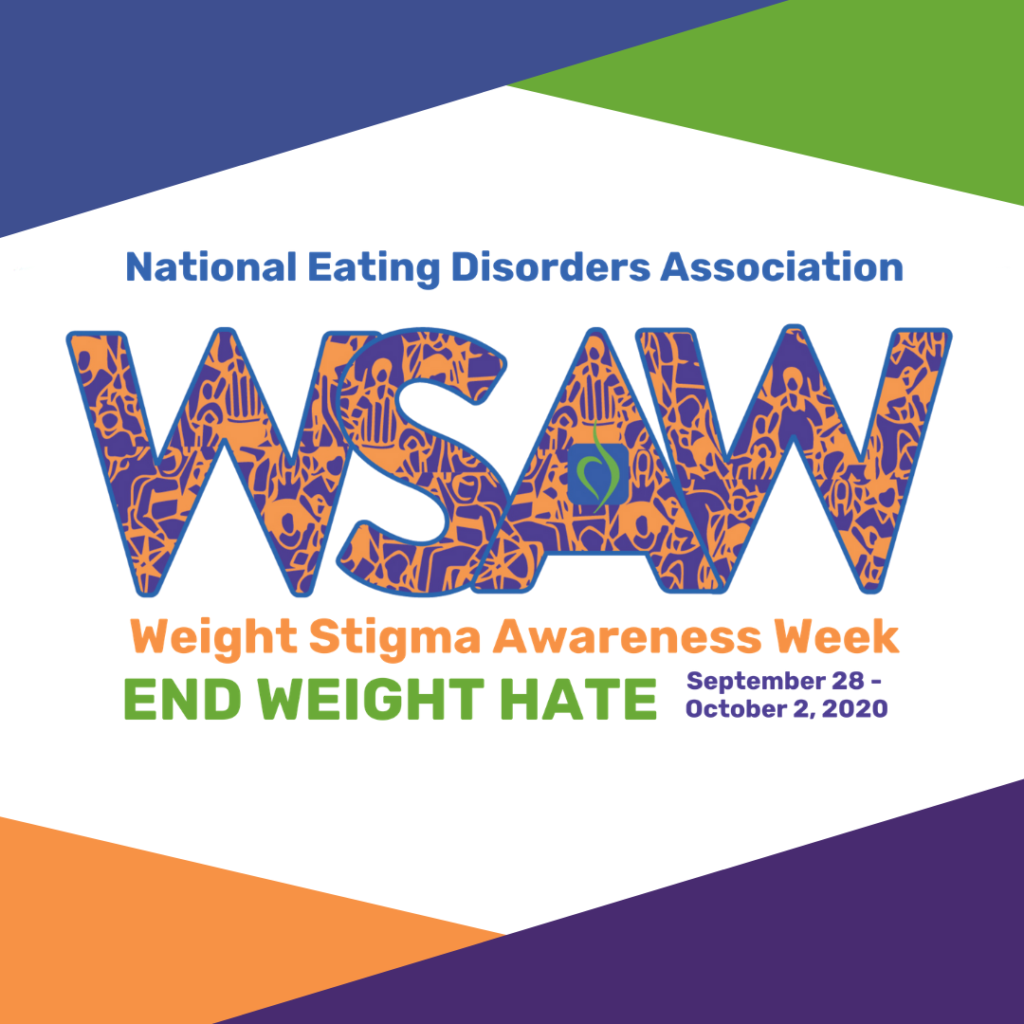
Weight stigma and how it affects ALL of us
Did you know this week was National Eating Disorder Association’s Weight Stigma Awareness Week?
In order to continue to push the weight-neutral health movement forward, we have to spread awareness of weight stigma and how it affects health. NEDA highlights weight stigma in this End Weight Hate campaign because weight stigma affects ALL OF US, whether your body is on the larger or smaller end of the spectrum.
I thought it would be fun to change things up and do a Q&A style post to discuss weight stigma and how it affects our collective health. Let’s get into it!
What is weight stigma in the first place?
According to NEDA, weight stigma is bias or discrimination against someone based on their weight. This is a very prominent form of discrimination in our society, but not one that we talk about enough. Weight-based discrimination is one of the most common types of discrimination in our society, and one that we’ve normalized to the point of viewing rude suggestions about someone’s weight as “caring”.
News flash!!!!! It is not helpful to tell someone what you think about their body size or how they should be trying to change it for the purpose of “caring about their health”. No one has the right to tell anyone else how to live in their own body. In fact, you have no right to tell someone they MUST live a healthy lifestyle!
If someone is asking for your help or advice, great! If they aren’t, it is not your place to provide your unsolicited opinion. When you do, you contribute to their experiences with weight stigma and could be deeply hurting someone you love, even if you thought your intentions were good.
Where and how does weight stigma occur?
Weight stigma occurs in every facet of our society. Health care, family, friends, the media, school, work, relationships, and the list goes on and on, unfortunately. As I mentioned before, weight stigma can occur through comments made by friends, family, and even strangers suggesting a diet or weight loss program under the guise of caring about someone’s health. But it also occurs through hateful comments, beliefs, and stereotypes about people in larger bodies.
Think of TV shows you’ve watched where the character in a larger body is dumb, lazy, always eating “unhealthy” food, and only really there to be the butt of the joke. Or the media’s obsession with the “obesity epidemic” paired with footage of people’s bodies as they walk down the street. We as a society perpetuate this idea that being in a larger body automatically makes you less healthy or less worthy of equal care.
On that note, one of the worst places that weight-based discrimination occurs is in health care. Nothing is more infuriating to me than finding out someone has been told to simply “lose weight” to solve their health problems without the same diagnostic testing someone in a smaller body would receive. People are even told to lose weight when they are perfectly healthy other than their supposedly “unhealthy” size! I have personally experienced this before, and in my experience it made me less interested in returning to the doctor for fear of more weight-based recommendations without appropriate diagnostic care. And I live in a body that is easily accepted by society, so I can’t imagine how much worse this feels for someone who lives experiencing weight discrimination every single day. It is lazy medical care to simply recommend weight loss without treating each patient’s concerns as you would treat ANY patient’s concerns with the same evidence-based care.
If you have experienced weight discrimination in your medical care, I encourage you to seek out resources from Health At Every Size practitioners or activists to arm yourself with the information you need to ask your health care provider for the equal care and dignity you DESERVE to be treated with. You can also consider seeking out a new provider if yours refuses to respect your wishes and treat you the way you deserve. Doctors work for YOU, NOT the other way around.
Here is a great article from DancesWithFat.org to start with: What to Say at the Doctor’s Office

Why is weight stigma harmful?
Weight stigma is harmful in a number of well-researched ways. To name a few, people who experience weight stigma:
- Have an increase in body dissatisfaction, the number one leading cause of the development of eating disorders.
Remember, eating disorders affect people in ALL SIZES of bodies. - Engage in more frequent disordered eating including restriction and binge eating.
- Are likely to experience weight bias from their doctors and in turn less likely to receive a proper medical diagnosis and care leading to poorer health outcomes.
- Can experience physiological changes leading to poor metabolic health and increased risk of chronic diseases like diabetes and cardiovascular disease.
- Have increased risk of depression, anxiety, stress, low self-esteem, and other psychological outcomes.
- Are less likely to engage in regular physical activity.
How does this affect me if I’m not in a larger body, though?
Weight stigma affects us all. People in smaller bodies live with an internalized fear of weight gain and living in a larger body BECAUSE of the weight stigma we all know exists and is experienced by people in larger bodies. This leads people in smaller bodies to follow restrictive diets (and we know chronic dieting itself has its own set of negative physiological and psychological health outcomes) and increases risk for the development of eating disorders. Diet culture and the $72 billion “wellness” industry take advantage of our cultural fatphobia to make money, without ever actually caring about our health.
How can I make sure I am not contributing to weight stigma?
The most important thing you can do to stop contributing to weight stigma is STOP commenting on people’s bodies, the way they eat, the way they exercise, and the way they choose to live. Let’s stop assigning morality to our behaviors around food and body. Stop following people who reinforce the thin ideal and confront people in your life when they stereotype and discriminate against people in larger bodies. Expose yourself to a variety of different bodies through the media you consume and normalize people in larger bodies living their normal lives.
It is extremely important for you to work on your own internalized fatphobia and confront the stereotypes you hold in your mind (probably even about yourself!) that contribute to fatphobia and weight stigma in our society. You should continue to educate yourself on why the idea that thin = healthy is FALSE and understand that ALL BODIES ARE WORTHY.

Finally, it is especially important for you to work on respecting and appreciating your own body and breaking free from the diet culture myth that you have to change or shrink yourself to be healthy or valuable. You never know how the comments you make about yourself to friends and family may affect someone else’s body image. Not to mention, being degrading towards yourself is NOT helping you either. Try to change your self-talk and stop following “fitspo” accounts that just make you feel bad. Working with a weight-neutral, HAES-informed provider (like me!) to heal your relationship with food and body is another great route to explore.
Once you can see YOUR body as unique and worthy of respect, it will open your eyes to the way each and every one of us, in bodies larger or smaller, are beautiful and worthy of that same respect.
I hope this has been a helpful Q&A about weight stigma and opens your eyes to the reality faced by so many people in our society.
Here’s to challenging the beliefs that hold us ALL back and working towards a more equal society.
If you have questions or are interested in book recommendations that can help you challenge your internalized fatphobic beliefs, shoot me an e-mail at lauren@nutritionwithlauren.com and I’d love to share some more info with you!
Have a great weekend,
— Lauren